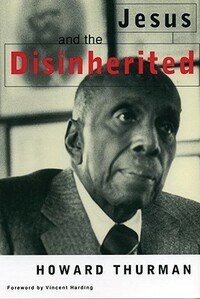Take a photo of a barcode or cover
challenging
hopeful
inspiring
medium-paced
challenging
informative
inspiring
challenging
hopeful
informative
inspiring
reflective
medium-paced
Everyone should read this one.
challenging
informative
reflective
slow-paced
Graphic: Racism
challenging
reflective
slow-paced
challenging
informative
inspiring
reflective
medium-paced
In less than 100 pages, Howard Thurman presents how the religion Christianity should be and it’s relationship with the disinherited. With searing phrases towards the complacency and racism of white Christianity, I would call this one of many essential readings to decolonize one’s faith.
I picked this book up for free off a book table at a church we visited. I wasn't sure what the book was about or who Howard Thurman was, but I thought I'd give it a try. After all, the book had been free! By the second page I realized I was going to need to grab a pencil to do some serious underlining. The first thing I underlined was, "[This] reveals to what extent a religion that was born of a people acquainted with persecution and suffering has become the cornerstone of a civilization and of nations whose very position in modern life has too often been secured by a ruthless use of power applied to weak and defenseless peoples."
Howard Thurman wrote the book in 1949, but he could have written it today. Other than the fact that segregation is no longer lawful and Jim Crow laws are not in place, not much has changed. How sad is it that almost 70 years later there is still active discrimination and a ruthless use of power applied to weak and defenseless peoples. If you are of the privileged class and wonder why there are so many problems with race relations, riots against the police, etc., you need to read this book as it will give you some great insights into how oppressed people default to fear, deception, and hate. It shows how the privileged have created unfair situations due to their own fear and hate and how they use deception. If you are one of the disinherited and know what it's like to live in fear, to face hate every day, and to revert to deception to survive, you also need to read this book to understand the importance of leaving behind fear, hate, and deception.
Best of all, Thurman offers hope in living with Jesus as our example of love. Jesus was certainly the poorest of the poor living in a Jewish society dominated by the Pharisees and their endless laws and ruled over by the cruel Romans. Yet Jesus said to "love your enemy". I think we know that Jesus was perfect and forget that he struggled with temptation. He must have been tempted more than once to hate the Pharisees and the Romans. Jesus' love was not wimpy. True love takes fortitude and strength of character to carry out, but Thurman leaves us with the hope that love can change our society.
Personally, I think every American should read this book, or at least everyone who says they follow Jesus.
Howard Thurman wrote the book in 1949, but he could have written it today. Other than the fact that segregation is no longer lawful and Jim Crow laws are not in place, not much has changed. How sad is it that almost 70 years later there is still active discrimination and a ruthless use of power applied to weak and defenseless peoples. If you are of the privileged class and wonder why there are so many problems with race relations, riots against the police, etc., you need to read this book as it will give you some great insights into how oppressed people default to fear, deception, and hate. It shows how the privileged have created unfair situations due to their own fear and hate and how they use deception. If you are one of the disinherited and know what it's like to live in fear, to face hate every day, and to revert to deception to survive, you also need to read this book to understand the importance of leaving behind fear, hate, and deception.
Best of all, Thurman offers hope in living with Jesus as our example of love. Jesus was certainly the poorest of the poor living in a Jewish society dominated by the Pharisees and their endless laws and ruled over by the cruel Romans. Yet Jesus said to "love your enemy". I think we know that Jesus was perfect and forget that he struggled with temptation. He must have been tempted more than once to hate the Pharisees and the Romans. Jesus' love was not wimpy. True love takes fortitude and strength of character to carry out, but Thurman leaves us with the hope that love can change our society.
Personally, I think every American should read this book, or at least everyone who says they follow Jesus.
This is my third time reading through Thurman's powerhouse text. The first two were as a part of the curriculum for the faith-based social justice program I was participating in, and now it's a few years later for a seminary course on capitalism and Christian witness. Despite having some familiarity with it, I was still struck by the density of insight here, packing such wisdom into a relatively short book. It's prophetic in both senses of the word: Presenting a robust critique against the injustices of his day, as well as a disturbing foretelling of many of the issues we're navigating in renewed intensity today (the resurgence of fascism, the normalization of hatred). I found his exegetical reading of Jesus in his particularly (as a poor Jewish man) to be the most compelling part of the book, and will confess that I was struck by how some of his later chapters feel so counter to the current zeitgeist. For example, his call for the oppressed to love their oppressor has obvious biblical links, but it's not at all fashionable among contemporary social justice circles (and with good reason). You could fault Thurman for laying too heavy a burden on the victims of injustice rather than the perpetrators of it...but that partly misses the intention of the book as one written to those with their back against the wall. Surely Thurman has a heavy burden to place upon the oppressor as well, but they are not his audience here, and he's not willing to lower standards for anyone (though he does express a profound depth of sympathetic understanding as to why the oppressed are drawn to deception and hatred as tools of survival). And the core of his argument for this nonetheless prioritizes the oppressed, whom he argues will find their moral sensibility, creative energy, and general soul corroded by hate if that's what one chooses to foster and feed. His unrelenting straightforwardness is both a strength and a weakness here, and I think womanist theologians with their emphasis on survival would offer some valuable critique and complication. This time around, I felt a desire for more practicality at times, particularly around what it looks like not only to love the oppressor as a fellow human, but to incentivize them to encounter you in order to do so in the first place? But there's no doubt that there's an abundance of wisdom here, which I'll happily revisit again.
challenging
informative
medium-paced
informative
slow-paced







